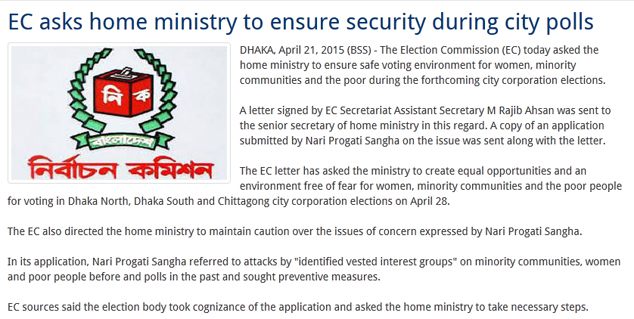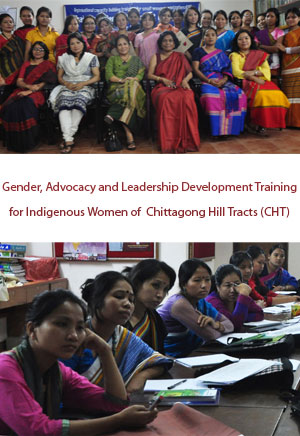| |
 |
After long break of 13 years the City Corporation Election was held on 28 April 2015 for Dhaka North City Corporation (DNCC) and Dhaka South City Corporation (DSCC). The Chittagong City Corporation (CCC) election was also held on the same date. It may be mentioned that the last election for Dhaka City Corporation (DCC) was held on 25 April, 2002 and CCC on 17 June 2010. DCC was divided into 2 parts on 30 November 2011 in DNCC and DSCC. After dividation this is the first city corporation election.
Though the Constitution of Bangladesh upholds equal citizenship for all citizens, the reality is quite different. Many sections among the citizens of the country are still marginalized and deprived of equal citizenship rights. During the election women, religious & ethnic minorities and poor people are treated as voter only and do not get the equal opportunity in expressing their opinions through votes. Even the candidates from these sections remain disadvantaged. The phrase ‘Level Playing Field’ is much used in Bangladesh but it seems to be applicable for big two political parties but not for all citizens. In different times it is seen that women, religious & ethnic minorities and poor people have become victim of violence and attacks. As a result they feel threatened pre, during and post election time and they cannot use their voting rights properly.
BNPS initiatives to Demand Fear-free Electoral Environment for Women, Minorities and Poor People:
Considering the previous incidents and experience BNPS took initiatives to demand fear free electoral environment for women, minorities and poor people. The initiatives included submission of memorandum to the Chief Election Commissioner, publish and publicize citizen charter and election observation in limited scale.
A 5-members representative team of BNPS led by Executive Director Ms. Rokeya Kabir met the Chief Election Commissioner on 13 April 2015 and submitted a memorandum demanding fear-free electoral environment for women, minorities and poor people. The Election Commission took a serious note on the issue and sent a request letter with this reference to the Home Ministry for taking necessary actions.
Election Observation:
A team of 35 volunteers was responsible for election observation in 3 city corporations. The election observers collected information on pre, during and post election situation from 21 April to 30 April following a prescribed format. Due to limitation of resources, the scale of observation was small.
Major Findings:
- Good thing is that there was no major incidence of violence against women or minorities. Still some incidences of harassment took place.
- Though there was enough arrangement for ensuring security, some violent fights caused injuries during election campaigns. In some places, women and minority community people passed the time in uncertainty.
- During election campaign women candidates felt unsafe and in some places women campaigners got injured.
- In some places, women election agents complained that the security arrangement for them was not enough.
- The number of candidates from women and minorities was negligible.
- There was not a single women candidate for Mayor Positions and only 23 women candidates out of total 907 candidates for 134 counselor (General) positions.
- In reserved seat of counselors for women, there were 248 candidates.
- There was only one mayor candidate from religious minority group, 11 general counselor candidates and 4 reserved women counselor candidates; in totally 16 candidates only.
- The political parties are reluctant to nominate women candidates in general posts as they think the possibility of winning for women candidate is very low.
- The probable women candidates expressed their agitation against men candidates for their non-cooperation.
- Some women leader complained that the political parties tell many things about women empowerment but are not sincere for it.
- The nominated women candidates faced a lot of obstacles in comparison to the men candidates. They faced a lot of harassment even from the men of their own party. Obstacles were created during their campaign.
- As most of the wealth is controlled by men and women do not own much money, it becomes difficult for them to compete with male counter-parts as men can spend huge amount of money during election campaign.
- The women candidates have to complete household works before going out for campaign. The reproductive burden on women created lot of obstacles on the way of continuing election campaign. Media also overlooked the women candidates.
- A lot of nominated women candidates are not much associated with grassroots politics rather than they got nomination on the name of their father, husband or father-in-law.
- It was hard to find out women campaigner in general seats. There were some exceptions but election campaign is mostly male dominated.
- There was no woman in the post of Returning officer or Assistant Returning officer in 3 CC elections. The percentage of women is negligible in 49,333 presiding officer, assistant presiding officer and poling officer.
- As a big political party opted out from the election on voting day, the environment turned gloomy which affected voter presence specially women voters.
- The poor people faced difficulties in finding out their voter numbers and centers. Moreover, as the public transport was not on the road, poor voters did not go to cast their vote considering high transportation expenses.
- A lot of poor people in the city corporation areas work in informal sector or others’ houses. These people did not avail holiday and could not go to cast their vote.
- In election observation the presence of women was satisfactory. No significant problem has been reported in election observation.
- Though use of religion and religious books are prohibited in election campaign, these have been used indirectly during campaigns. Illegal use of money was found to buy votes especially of poor voters.
Recommendations:
For Election Commission
- Level playing field should be ensured not only for political parties and candidates but also for women, minorities and poor people.
- Deploying law enforcement forces is not enough; safety and security should be ensured for all. Necessary training for increasing their sensitivity to women, minorities and poor people may be arranged.
- Effective strategies should be prepared to pressurize political parties to nominate more women, minorities and poor people.
- Effective monitoring system should be deployed to prevent from use of excess money and religion during election campaigns as well as not following code of conducts.
- More women should be recruited as Returning Officer, Assistant Returning Officer, Presiding Officer, Assistant Presiding Officer and Polling Officer to increase the percentage of women. Sex segregated data in this regard should be preserved and published.
For Political Parties
- Women, minorities and poor people friendly manifesto of political parties is not enough, it should be reflected in nominations.
- The democratic norms, behaviours and practices should be ensured by the candidates during election campaign.
- Candidates with anti women and/or minorities mindset should not be supported by the political parties. If any candidate behaves like that or comments against women and/or minorities or their rights, the political parties should withdraw their support.
- In nominating women, her own educational background and political capacity should be considered instead of family wealth and/or influence.
- More educated women should be deployed in election campaigns and as poling agents. They should be trained up properly in this regard.
For Media and Civil Society
- Initiatives should be taken to create equal opportunities for women, minorities and poor people in all elections. Media should be more sensitive in publishing news in this regard.
- Proper steps should be taken to stop anti women and minorities campaign in elections.
|






